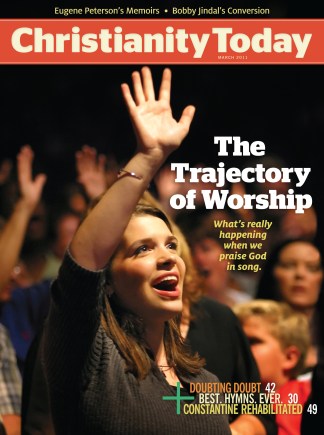On a recent trip to England, I sat beside a young man who, when he learned I am a preacher, started asking questions with a noticeable amount of energy. He wanted to know if my church allowed me to marry and whether I thought women could preach. He asked how I get paid and what I do when I'm not preaching. This persisted for over an hour. Having grown up in a post-Christian culture, this fellow had a vague notion of what a pastor is but clearly had never talked to one.
In American culture, being a pastor is not enough of an oddity to start an hour-long conversation with a stranger. (More often than not, telling your airplane seatmate that you're a pastor is enough to ensure an awkward silence for the remainder of the flight.) Still, if you spend any time with pastors, even around here, it is clear our vocation is facing something of a crisis. Many pastors aren't sure how to describe their calling or explain why it matters to the rest of the world.
In the introduction to his new book, The Pastor: A Memoir (HarperOne), Eugene H. Peterson addresses this crisis head-on: "North American culture does not offer congenial conditions in which to live vocationally as a pastor. Men and women who are pastors in America today find that they have entered into a way of life that is in ruins."
Though the rhythms of his voice are familiar to admirers of The Message, this is not Paul or Moses or Jesus speaking in Peterson's contemporary American idiom. It is, instead, Peterson himself, attending to the text of his life—mining it, even, for some understanding of what it has meant to be a pastor. Unless you're traveling in Europe, the book probably won't leave any airline companions in a state of puzzlement. But it is a gift to anyone who has tried answering the call to pastor, and to a church that needs true pastors, whether we know it or not.
The Pastor as Pilgrim
Peterson's own story is rooted in the American West, where he was born and to which he returned throughout his pastorate in a restorative rhythm of annual Sabbath. Since leaving his pulpit at Christ Our King Presbyterian Church in Bel Air, Maryland, and his professorship at Regent College, Peterson has retired to his native Montana. In many ways, this is a book he could only have written from home. But the strong sense of place that grounds his narrative does not negate the pilgrimage that took Peterson to New York City as a seminary student or to Baltimore's suburbs as a young pastor.
Indeed, his journey bears witness to a true pilgrimage—not just a tourist's jaunt—because it has been conditioned by an attention to place and an eye for what is happening on the ground. If I were pressed to pull one definition of pastor from this story, it'd have to be this: "the person placed in the community to pay attention to 'what is going on right now' between men and women, with each other and with God—this kingdom of God that is primarily local, relentlessly personal, and prayerful 'without ceasing.'?" This is what Peterson grew out of Montana's soil to become.
But he didn't know that when he started. A lover of words, Peterson aspired to write novels in his youth. After setting his sights on the more reasonable profession of professor, he took a side job as the associate minister at a Presbyterian church. "I did it for the money and only for the money," he confesses, "for I had no intention at the time of being a pastor."
One thing this story makes clear is that vocation is not so much about what we want as about how we respond to God's interruptions in our lives. While in seminary, an artist friend warned Peterson against becoming a religious professional. This friend painted a portrait of Peterson as an aged cleric devoid of vitality. Before finding his way to pastoring a church, Peterson was painfully aware of the failure that success in that vocation can be. He didn't set out for the career of being a pastor; Peterson paid attention to God until he realized that a pastor is what he was created to be.
Pastors familiar with Peterson's work on the pastoral vocation—The Contemplative Pastor, Working the Angles, Under the Unpredictable Plant—will recognize his suspicion of strategies to "get things done" and models for church growth. The Pastor locates that intuition in the story of one who came to the pastorate indirectly. Looking back, he realizes he was prepared for the work all along. But his models were not pastors. They were his mother, the storyteller, and his father, the butcher. They were the artists who taught him to be a contemplative who resists the efficiency of the market for the sake of his own soul. Peterson's stubborn refusal to assume a ready-made vocational identity left room for a broader set of influences than you'd find in the typical seminary or denominational formation program.
These influences cultivated something beyond a critical posture toward church marketing. When called to plant a church in suburban Maryland, he knew not to trust the franchise model retailed by "experts." (What's more, he had the chutzpah to assume no one was reading his monthly presbytery reports and so turned them into playful exercises in creative writing!)
It is clear the pastor's vocation is facing something of a crisis. Many pastors aren't sure how to describe their calling or explain why it matters to the rest of the world.
Yet this posture was rooted in a positive call that sustained such stubborn resistance. "If we were to be formed as a church after the pattern of Acts, we absolutely had to absorb it into our imagination as a story, not a manual." Peterson resolved to invite suburban Christians to live the story the Bible told.
It worked. Steadily, like a tree planted in good soil, the church plant grew into a congregation. They moved from the pastor's basement to a carefully designed and beautifully constructed building. People came. Their lives got caught up with one another's—they even showed signs of being caught up in life-with-God. Peterson had succeeded as church planter. But he had not yet become a pastor. He'd not yet learned to walk with people—to pay careful attention to the ups and downs of their lives—when there wasn't a building project to bring them together. Growing into this vocation took time. Thankfully, he stayed. And he lived to tell the stories.
The Pastor includes some great stories about a church that welcomed children who had lost their parents and an ex-con who had found Jesus and brought his Alcoholics Anonymous group into the congregation. These stories help you believe in the power of something as mundane as gathering people to worship week after week. But they are not miracle stories. They don't read like anecdotes to support the case for another church growth model. Instead, the stories reflect the argument behind Peterson's life work: God is redeeming the world—even raising the dead to new life—through a peculiar people called the church.
In his classic Diary of a Country Priest, Georges Bernanos captivated his audience by helping them see through a pastor's eyes a vision of lives claimed by God. This seeing is important in every age, but especially in an "image culture" so often claimed by the power of the market. Dazed by the latest offering from Apple or YouTube, we long for a connection less plastic and polished. Our hearts are restless for a real church we can see, for a world redeemed in real time. Where do we go to remember that another world—another church—is possible? Peterson's memoir gives us space to imagine new possibilities in the midst of daily suburban lives. Like Bernanos's classic, it is a subtle manifesto of hope for our time.
Jonathan Wilson-Hartgrove is co-compiler of Common Prayer: A Liturgy for Ordinary Radicals (Zondervan, 2010).
Copyright © 2011 Christianity Today. Click for reprint information.
Related Elsewhere:
Eugene H. Peterson is the author of The Message and other books.
His articles and interviews with Christianity Today include:
Meditating Like a Dog | Eugene Peterson on the discipline of spiritual reading. (May 31, 2007)
Spirituality for All the Wrong Reasons | Eugene Peterson talks about lies and illusions that destroy the church. (March, 2005)
Inside CT: Hospitality Incarnate | Eugene Peterson lives what he teaches. (March, 2005)
'I Didn't Want to Be Cute' | Author Eugene Peterson describes what drove his writing of The Message (October 7, 2002)
Holy Saturday | Part three of The Great Reversal, a CT Classic article (April 1, 2000)
To the Suburban Churches of North America | A message from the Son of God, Jesus, whom you call Master and who calls you to follow him. (October 25, 1999)
Highlights: The Subversive Shepherd | Eugene Peterson calls pastors to return to the hard work of making saints. (July 14, 1997)











